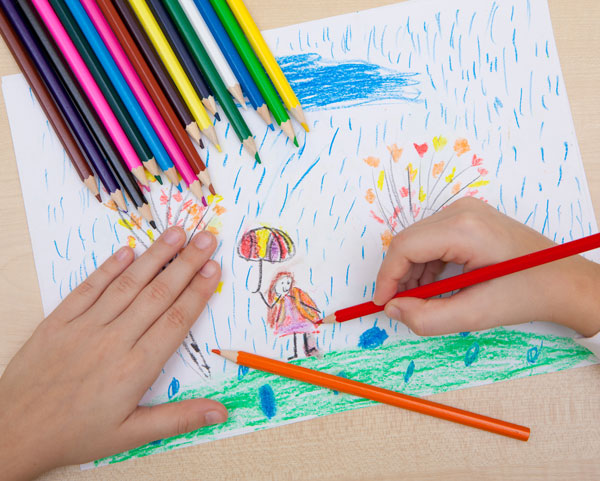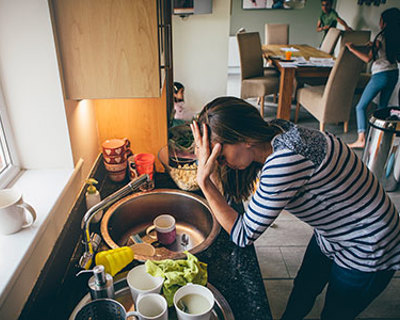Activities to help your family feel better
 With more time together and at home this summer your family might feel extra moments of upset or stress. It’s natural and there are things you can try to help you all feel better.
With more time together and at home this summer your family might feel extra moments of upset or stress. It’s natural and there are things you can try to help you all feel better.
Our Children 1st Parentline team have suggested some activities to help your children – and you – feel calmer. Try some and see which ones your children like most. You know your child best and know what they will find relaxing. And if you’re worried about them, or you’re feeling stressed or overwhelmed yourself, we’re here for you.
Activities to help your family feel better
This is a great way to help children think about their different senses. Chop us some different food into small pieces. Ask your child to put on a blindfold and then put a piece of food in their hand. Tell them to take their time and think about what they can find out about it. Is it hard or soft? Does it have a smell? What does is taste like? See if your child can guess what it is. If you’re feeling brave you could have a go too!
This exercise isn’t one for if your children are feeling very tense or anxious. It’s a fun way to bring some mindfulness into your day. Your children could take turns and see who guesses the most foods.
Creating a safe place is a lovely way to prepare for stressful moments before they happen. Ask your child to imagine a magical safe place. It could be anything – a beach, a forest or a football pitch. It’s a special place they can go in their mind when they feel stressed or worried.
Help your child build a clear picture of their safe place. What does it feel like there? What can they see, hear, smell and touch? Ask them to give their safe place a name. They could do a drawing or some craft to make a picture of it. When moments of tension or anxiety come up you can suggest that your child thinks about their safe place. Use the name they chose and let them know it’s always there.
You can help your child engage with this activity by creating a safe place of your own. It’s useful for us all to find moments of quiet and calm. Try doing the activity alongside your child. It will help them see that everyone needs to find ways to look after themselves.
Our minds and bodies are linked – if your body is more relaxed your mind will be too. Focus on relaxing every muscle in your body by tensing them, holding and then letting them go. Work through your muscles one by one. Start from the top, by scrunching up your whole face, down to the bottom by squeezing your toes together. Talk your children through it so they can follow along. Ask them how they feel afterwards.
You need two people for this exercise. It could be two siblings who’ve been squabbling (but don’t force them together if the tension is high). Sit back to back, put your hands on your tummy and take deep, slow breaths. Big breath in for three and big breath out for three. Imagine filling up your lungs and your tummy with air. Think about the other person’s breathing – does it sound different or the same as yours? Can you feel their back moving against you as you breathe in and out?
People are different. One of your children might find it easy to take big breaths and the other might not. Tell them that’s OK. We’re all different and that makes us special. It will feel more like a game if the adults or other children in the house can join in too.
It can be difficult for children to tell you how they feel. Thinking about feelings as colours can help. You can use coloured pencils or just imagine different colours.
A quick way to check in with your child could be to ask them first thing “What colour are you this morning?”. There are no right or wrong answers. The colours can mean whatever your child wants. Then at bedtime you could ask “What colour are you tonight? What was your favourite thing about today?”. This leaves your child with a moment of mindfulness and gratitude to fall asleep to.
Our Care Cards are a good reminder to pause and take a moment for you. When we are kind to ourselves, ask for support, relax, and distract ourselves from non-essential worries and tasks, we take good care of ourselves - and we encourage our children to do the same!
We’ve created blank ones for you to fill in. Take a look at the cards on our mental health pages.
Mindfulness is a skill and it will take practice. It’s like a muscle – if you exercise it regularly it will get stronger and feel easier. If you try an activity and it doesn’t go well that’s fine. Don’t put pressure on yourself or your child to ‘get it right’, just see what happens. If you keep it light and fun your child is more likely to want to try it again. And you are more likely to have the energy too!
Children 1st Parentline is here for you and your family. If you’re worried or feeling overwhelmed please get in touch.


